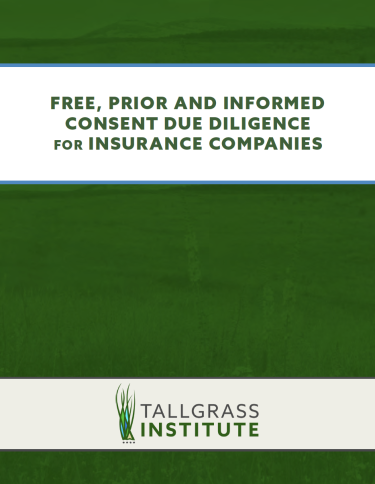Tallgrass Institute Publishes FPIC Due Diligence Guide for Insurers

Within the insurance industry, there are multiple touchpoints with Indigenous Peoples. Insurance companies with policies that respect Indigenous Peoples’ right to self-determination and to free, prior and informed consent (FPIC) may find more opportunity to partner in an expanding marketplace. There is also a growing recognition among insurance providers of the risks associated with failing to respect Indigenous Peoples’ rights.
Tallgrass Institute’s Free, Prior and Informed Consent Due Diligence for Insurers provides insurance companies with a framework to operationalize due diligence to respect the rights of Indigenous Peoples, grounded in their right to FPIC.
The guide discusses the insurance business case for FPIC due diligence and delineates questions insurance underwriters should ask to integrate respect for Indigenous Peoples into business operations. These questions provide a mechanism for enhanced due diligence that aligns with the UN Guiding Principles on Business and Human Rights and the UN Declaration on the Rights of Indigenous Peoples so that insurance companies can integrate consistent consideration across jurisdictions at the highest levels into underwriting.
Whether designing due diligence for broad spectrum insurance (e.g. insurance across an entire business such as treaty insurance, reinsurance, coverage of multiple risks) or project-level insurance (e.g. a single mining project), key considerations for insurers include:
- Indigenous Peoples’ right to FPIC applies broadly across sectors and applies when either or both positive or negative impacts are contemplated.
- FPIC due diligence begins when companies apply for an insurance product. Insurers should ask applicants to demonstrate policies and practices regarding Indigenous Peoples’ rights and alignment with international standards.
- To provide robust FPIC due diligence, insurance companies should ask applicants to assess and disclose how their projects impact Indigenous Peoples.
- Insurance companies should ask applicants to document their engagement with impacted Indigenous Peoples, including the process for obtaining consent, grievance mechanisms, and plans for continuous engagement throughout the project lifecycle.
- Many Indigenous Peoples have developed their own FPIC protocols for engaging with governments, companies, and outside entities. Insurance companies and their business customers should integrate local FPIC protocols when engaging with Indigenous Peoples.
- When operationalized in a rights-based manner, FPIC forms the basis of meaningful engagements.
The guide examines case studies both where FPIC has informed the basis of equitable engagements, and where moving forward without FPIC has led to considerable material losses and reputational damage, emphasizing the need for tailored and robust due diligence processes.
Neglecting to identify and assess risks related to Indigenous Peoples’ rights can lead to “inaccurate risk assessments, insufficient coverage, and unexpected expenses,” according to the guide. This exposes companies “to social unrest, legal actions, government inquiries, reputational harm, project delays, budget overruns, and potential civil or criminal penalties.” The guide notes heightened risk in industries that involve land, water, and natural resources, and for companies involved in construction, infrastructure development, natural resource extraction, agriculture, and energy.
In recent years, several global insurers have prioritized Indigenous Peoples’ rights in their underwriting policy and practices. However, there remains considerable deficiencies in the industry that exacerbates risks from projects that impact Indigenous Peoples. By adopting strong due diligence and FPIC policies, insurers benefit from a more comprehensive understanding of risk, risk mitigation, legal compliance, and reduced liability, and minimizing disruptions, uncertainties, and conflicts.
___
Free, Prior and Informed Consent Due Diligence for Insurers is supplementary to Tallgrass Institute’s Free, Prior and Informed Consent Due Diligence Questionnaire for investors and among a suite of FPIC due diligence resources. Contact Tallgrass Institute for more information and to schedule a training or consultation.

